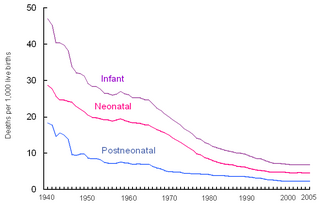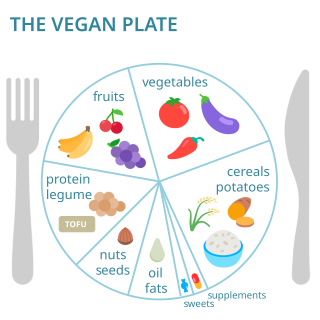Related Research Articles

Isoleucine (symbol Ile or I) is an α-amino acid that is used in the biosynthesis of proteins. It contains an α-amino group (which is in the protonated −NH+3 form under biological conditions), an α-carboxylic acid group (which is in the deprotonated −COO− form under biological conditions), and a hydrocarbon side chain with a branch (a central carbon atom bound to three other carbon atoms). It is classified as a non-polar, uncharged (at physiological pH), branched-chain, aliphatic amino acid. It is essential in humans, meaning the body cannot synthesize it. Essential amino acids are necessary in the human diet. In plants isoleucine can be synthesized from threonine and methionine. In plants and bacteria, isoleucine is synthesized from pyruvate employing leucine biosynthesis enzymes. It is encoded by the codons AUU, AUC, and AUA.
Orthomolecular medicine is a form of alternative medicine that aims to maintain human health through nutritional supplementation. The concept builds on the idea of an optimal nutritional environment in the body and suggests that diseases reflect deficiencies in this environment. Treatment for disease, according to this view, involves attempts to correct "imbalances or deficiencies based on individual biochemistry" by use of substances such as vitamins, minerals, amino acids, trace elements and fatty acids. The notions behind orthomolecular medicine are not supported by sound medical evidence, and the therapy is not effective for chronic disease prevention; even the validity of calling the orthomolecular approach a form of medicine has been questioned since the 1970s.

Weight loss, in the context of medicine, health, or physical fitness, refers to a reduction of the total body mass, by a mean loss of fluid, body fat, or lean mass. Weight loss can either occur unintentionally because of malnourishment or an underlying disease, or from a conscious effort to improve an actual or perceived overweight or obese state. "Unexplained" weight loss that is not caused by reduction in calorific intake or increase in exercise is called cachexia and may be a symptom of a serious medical condition.

Vegetarian nutrition is the set of health-related challenges and advantages of vegetarian diets.
The glycemic load (GL) of food is a number that estimates how much the food will raise a person's blood glucose level after it is eaten. One unit of glycemic load approximates the effect of eating one gram of glucose. Glycemic load accounts for how much carbohydrate is in the food and how much each gram of carbohydrate in the food raises blood glucose levels. Glycemic load is based on the glycemic index (GI), and is calculated by multiplying the weight of available carbohydrate in the food (in grams) by the food's glycemic index, and then dividing by 100.

A healthy diet is a diet that maintains or improves overall health. A healthy diet provides the body with essential nutrition: fluid, macronutrients such as protein, micronutrients such as vitamins, and adequate fibre and food energy.
Nutritional genomics, also known as nutrigenomics, is a science studying the relationship between human genome, human nutrition and health. People in the field work toward developing an understanding of how the whole body responds to a food via systems biology, as well as single gene/single food compound relationships. Nutritional genomics or Nutrigenomics is the relation between food and inherited genes, it was first expressed in 2001.

Low birth weight (LBW) is defined by the World Health Organization as a birth weight of an infant of 2,499 g or less, regardless of gestational age. Infants born with LBW have added health risks which require close management, often in a neonatal intensive care unit (NICU). They are also at increased risk for long-term health conditions which require follow-up over time.
The Academy of Nutrition and Dietetics is a 501(c)(6) trade association in the United States. With over 112,000 members, the association claims to be the largest organization of food and nutrition professionals. It has registered dietitian nutritionists (RDNs), nutrition and dietetics technicians registered (NDTRs), and other dietetics professionals as members. Founded in 1917 as the American Dietetic Association, the organization officially changed its name to the Academy of Nutrition and Dietetics in 2012. According to the group's website, about 65% of its members are RDNs, and another 2% are NDTRs. The group's primary activities include providing testimony at hearings, lobbying the United States Congress and other governmental bodies, commenting on proposed regulations, and publishing statements on various topics pertaining to food and nutrition.

Perinatal mortality (PNM) is the death of a fetus or neonate and is the basis to calculate the perinatal mortality rate. Perinatal means "relating to the period starting a few weeks before birth and including the birth and a few weeks after birth."

Protein–energy undernutrition (PEU), once called protein-energy malnutrition (PEM), is a form of malnutrition that is defined as a range of conditions arising from coincident lack of dietary protein and/or energy (calories) in varying proportions. The condition has mild, moderate, and severe degrees.

A salt substitute, also known as low-sodium salt, is a low-sodium alternative to edible salt marketed to reduce the risk of high blood pressure and cardiovascular disease associated with a high intake of sodium chloride while maintaining a similar taste.
Intermittent fasting is any of various meal timing schedules that cycle between voluntary fasting and non-fasting over a given period. Methods of intermittent fasting include alternate-day fasting, periodic fasting, such as the 5:2 diet, and daily time-restricted eating.
Nutriepigenomics is the study of food nutrients and their effects on human health through epigenetic modifications. There is now considerable evidence that nutritional imbalances during gestation and lactation are linked to non-communicable diseases, such as obesity, cardiovascular disease, diabetes, hypertension, and cancer. If metabolic disturbances occur during critical time windows of development, the resulting epigenetic alterations can lead to permanent changes in tissue and organ structure or function and predispose individuals to disease.

Vegan nutrition refers to the nutritional and human health aspects of vegan diets. A well-planned vegan diet is suitable to meet all recommendations for nutrients in every stage of human life. Vegan diets tend to be higher in dietary fiber, magnesium, folic acid, vitamin C, vitamin E, and phytochemicals; and lower in calories, saturated fat, iron, cholesterol, long-chain omega-3 fatty acids, vitamin D, calcium, zinc, and vitamin B12.

Social class differences in food consumption refers to how the quantity and quality of food varies according to a person's social status or position in the social hierarchy. Various disciplines, including social, psychological, nutritional, and public health sciences, have examined this topic. Social class can be examined according to defining factors — education, income, or occupational status — or subjective components, like perceived rank in society.
Ravinder Goswami is an Indian endocrinologist and professor at the department of endocrinology and metabolism at the All India Institute of Medical Sciences, Delhi. Known for his research on vitamin D deficiency, Goswami is an elected fellow of National Academy of Sciences, India and Indian Academy of Sciences. The Council of Scientific and Industrial Research, the apex agency of the Government of India for scientific research, awarded him the Shanti Swarup Bhatnagar Prize for Science and Technology, one of the highest Indian science awards for his contributions to Medical Sciences in 2008.
The Journal of Human Nutrition and Dietetics is a bimonthly peer-reviewed medical journal covering nutrition science as it relates to humans. It was founded in 1982 as Human Nutrition. Applied Nutrition, which was one of two journals that superseded the Journal of Human Nutrition. In 1988, Human Nutrition. Applied Nutrition and Human Nutrition: Clinical Nutrition were combined into the European Journal of Clinical Nutrition, at which point the Journal of Human Nutrition and Dietetics was founded as its own journal. It is published by John Wiley & Sons on behalf of the British Dietetic Association, of which it is the official journal. The editor-in-chief is Simon Langley-Evans, who will hand over the role to Lauren Ball in 2024. Past editors were Pat Judd, Jane Thomas, Joan Gandy and Ailsa Brotherton. According to the Journal Citation Reports, the journal has a 2020 impact factor of 3.089, ranking it 58th out of 89 journals in the category "Nutrition & Dietetics".
Fetal programming, also known as prenatal programming, is the theory that environmental cues experienced during fetal development play a seminal role in determining health trajectories across the lifespan.

Esther Kathleen Keen Zolber was an American registered dietitian, Seventh-day Adventist and vegetarianism activist. She was president of the American Dietetic Association 1982–1983.
References
- ↑ Langley-Evans, Simon. "Simon Langley-Evans".
- ↑ "Silver Medal". www.nutritionsociety.org. The Nutrition Society. Retrieved 17 January 2022.
- ↑ Langley-Evans, Simon C.; McMullen, Sarah (2010). "Developmental Origins of Adult Disease". Medical Principles and Practice. 19 (2): 87–98. doi: 10.1159/000273066 . ISSN 1011-7571. PMID 20134170. S2CID 13719303.
- ↑ Langley-Evans, Simon C. (2009). "Nutritional programming of disease: unravelling the mechanism". Journal of Anatomy. 215 (1): 36–51. doi:10.1111/j.1469-7580.2008.00977.x. ISSN 1469-7580. PMC 2714637 . PMID 19175805.
- ↑ https://www.nottingham.ac.uk/registrar/registrars-office/vc-medal.aspx
- ↑ Langley-Evans, Simon C. (2023). "Bad science: time for our community to do better". Journal of Human Nutrition and Dietetics. 36 (4): 1127–1130. doi:10.1111/jhn.13165. PMID 37067000. S2CID 258180783.
- ↑ Langley-Evans, Simon C. (2023). "Burnout: The peril stalking academics and researchers". Journal of Human Nutrition and Dietetics. 36 (4): 1127–1130. doi:10.1111/jhn.13135. PMID 37066996. S2CID 258178428.
- ↑ "langley-evans - Search Results - PubMed". PubMed. Retrieved 17 January 2022.
- ↑ Fetal nutrition and adult disease : programming of chronic disease through fetal exposure to undernutrition. S. C. Langley-Evans. Wallingford, Oxfordshire, OX: CABI Pub. in association with the Nutrition Society. 2004. ISBN 0-85199-062-2. OCLC 182530283.
{{cite book}}: CS1 maint: others (link) - ↑ Early life origins of ageing and longevity. Alexander Vaiserman. Cham. 2019. ISBN 978-3-030-24958-8. OCLC 1114337657.
{{cite book}}: CS1 maint: location missing publisher (link) CS1 maint: others (link) - ↑ The biology of child health : a reader in development and assessment. Sarah Neill, Helen Knowles. Basingstoke: Palgrave Macmillan. 2004. ISBN 0-333-77636-4. OCLC 56672014.
{{cite book}}: CS1 maint: others (link) - ↑ Perinatal programming : the state of the art. Andreas Plagemann. Berlin: De Gruyter. 2012. ISBN 978-3-11-024945-3. OCLC 769343064.
{{cite book}}: CS1 maint: others (link) - ↑ Personalized nutrition : principles and applications. Frans Kok, Laura Bouwman, Frank Desiere. Boca Raton: CRC Press. 2008. ISBN 978-0-8493-9281-8. OCLC 105457215.
{{cite book}}: CS1 maint: others (link) - ↑ Langley-Evans, Simon (17 August 2015). Nutrition, health and disease (2nd ed.). John Wiley & Sons. doi:10.1002/9781119180432. ISBN 9781119180432.
- ↑ "Nutrition: A Lifespan Approach". Wiley. Retrieved 17 January 2022.
- ↑ Langley-Evans, S. C. (2021). Nutrition, Health and Disease : A Lifespan Approach (3rd ed.). John Wiley & Sons. ISBN 978-1-119-71754-6. OCLC 1287758905.
- ↑ Knighton, Kate (2008). Why shouldn't I eat junk food?. Adam Larkum, Jane Chisholm, Susan Meredith. [Tulsa, Okla.]: [EDC Pub.] ISBN 978-0-7945-1953-7. OCLC 179830663.